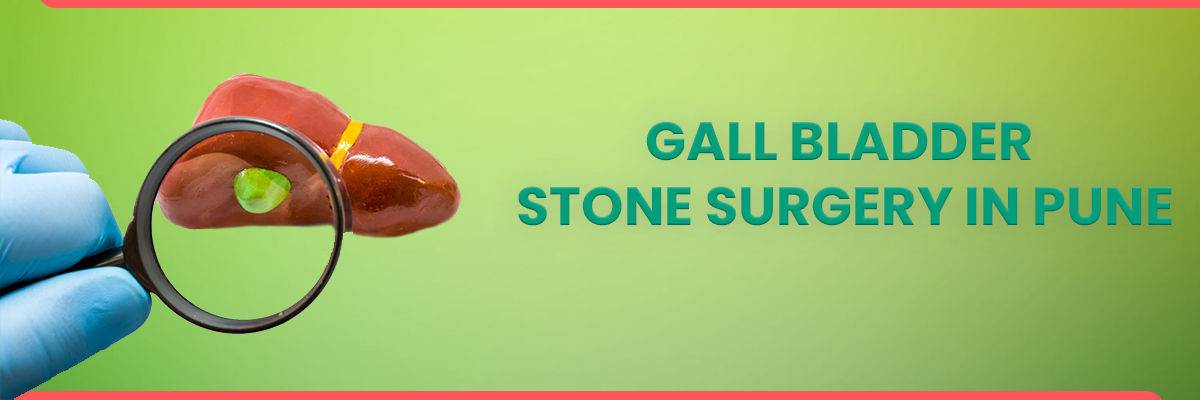
Gallbladder Stone Surgery in Pune, India
If you or a loved one are facing gallbladder stone-related issues and seeking expert medical care in Pune, you’ve come to the right place. Dr. Samrat Jankar is a highly skilled and experienced laparoscopic surgeon specializing in gallbladder stone surgery in Pune, Maharashtra, committed to providing top-notch healthcare solutions with compassion and precision and offering state-of-the-art treatments with a patient-centric approach. Dr. Samrat Jankar is a qualified surgical gastroenterologist and colorectal surgeon and has been awarded a gold medal for fellowship in colorectal surgery by the Association of Colon & Rectal Surgeons of India (ACRSI) board. He is known for his dedication to patient well-being and his commitment to utilizing advanced surgical techniques like laparoscopic and minimally invasive surgeries that ensure minimal invasiveness, reduced recovery times, and optimal outcomes. With a proven track record of successful surgeries, Dr. Jankar has earned his reputation as a trusted name in the field of gastrointestinal surgery.
Don’t let gallbladder stones disrupt your life. Dr. Samrat Jankar and his team are dedicated to providing exceptional gallbladder stone surgery in Pune, Maharashtra. With their expertise, advanced technology, and patient-centered approach, you can trust them to guide you toward a healthier future. Schedule a consultation today and take the first step towards gallstone-free living.
What is gallbladder stones (cholelithiasis)?
Gallbladder stones, also known as gallstones or cholelithiasis. Gallstones (cholelithiasis) are hard deposits that form in the gallbladder. The gallbladder is a small organ located below the liver that stores bile, a fluid that helps digest fats. Gallstones can be made of bilirubin, cholesterol, or a combination of both. These stones can vary in size and composition, and they can develop for several reasons. Gallbladder stones do not disappear by themselves.
Dr. Samrat Jankar, a leading surgical gastroenterologist in Pune, Maharashtra who does Best GallStone Surgery in Pune, India, may decide to remove your gallbladder if it begins to pain or causes other symptoms. Around 80% of people with gallbladder stones will require surgery. Cholecystectomy is one of the most common procedures performed by doctors to remove gallbladder stones.
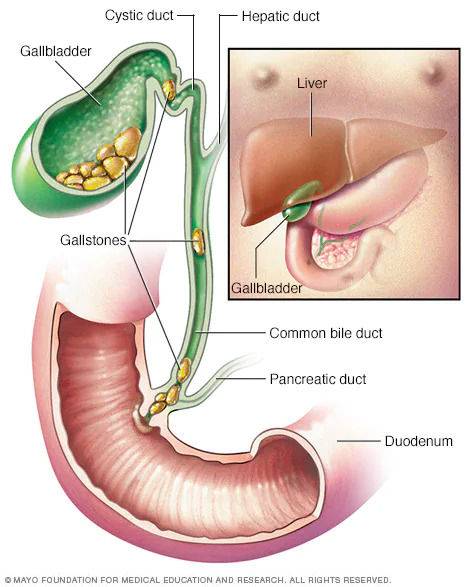
Type of Gall-stones:
- Cholesterol gallstones: Cholesterol gallstones are the most ordinary type of gallstones. They are made up of cholesterol, which is a type of fat. Cholesterol gallstones are more likely to develop in individuals who are overweight or obese, have a family history of gallstones, or have specific medical conditions, such as diabetes or liver disorder.
- Pigment gallstones: Pigment gallstones are made up of bilirubin, a substance that is produced when red blood cells break down. Pigment gallstones are more likely to develop in individuals who have a liver disease that causes them to produce too much bilirubin, such as cirrhosis or hemolytic anemia.
What are the symptoms of gallbladder stones?
Gallbladder stones are asymptomatic in around 70% of instances. They can cause the following symptoms:
- Infrequent but severe pain in the back and abdomen
- Increase in the intensity of pain after consuming fatty food
- Jaundice
- If the gallbladder or bile duct becomes infected, it can cause fever and pain.
- Bloating
- Indigestion
- Nausea and vomiting
What are the causes of gallbladder stones?
The exact cause of gallstones is not fully comprehended, but there are a number of factors that can improve your risk of developing them. These include:
- Being overweight or obese
- Family history of gallstones
- Certain medications, such as clofibrate and octreotide
- Certain medical conditions, such as diabetes and liver disease
- Being female
- Rapid weight loss
- Being over the age of 40
- Pregnancy
- Eating a diet high in cholesterol and fat
- Eating a diet low in fiber
- Not getting enough exercise
Complications of gallbladder stones (cholelithiasis):
The complications of gallstones can include:
- Acute cholecystitis: This is an inflammation of the gallbladder. It is the most ordinary complication of gallstones. Acute cholecystitis can cause intense pain in the upper right abdomen, nausea, vomiting, and fever.
- Ascending cholangitis: This is an infection of the bile ducts. It can happen when a gallstone blocks the bile duct and bacteria are able to grow in the thick bile. Ascending cholangitis can cause fever, chills, jaundice, and pain in the upper right abdomen.
- Pancreatitis: This is an inflammation of the pancreas. It can happen when a gallstone blocks the pancreatic duct and pancreatic enzymes are unable to flow into the small intestine. Pancreatitis can cause extreme pain in the upper abdomen, nausea, vomiting, and fever.
- Gallstone ileus: This is a rare complication of gallstones. It happens when a gallstone blocks the small intestine. This can cause nausea, vomiting, and abdominal discomfort.
- Gallbladder cancer: Gallbladder cancer is a rare cancer that originates from the lining of the gallbladder. It is more likely to happen in individuals who have had gallstones for many years.
If you have gallstones, it is important to seek medical attention immediately. These complications can be serious & even life-threatening.
How are gallbladder stones diagnosed?
Dr. Samrat Jankar, an expert in gallbladder stone specialsit in Pune, India, will examine you and evaluate your eyes and skin for color changes caused by too much bilirubin in your system.
For an exact diagnosis, he may ask you to undergo a few tests, such as:
- Blood tests
- Abdominal CT scan
- Ultrasound
- Hepatobiliary iminodiacetic acid (HIDA) scan
- Magnetic resonance
- Magnetic resonance imaging (MRI)
- Endoscopic ultrasound
- Magnetic resonance cholangiopancreatography (MRCP)
- Endoscopic retrograde cholangiopancreatography (ERCP)
Treatment of Gallbladder Stone in Pune, Maharashtra:
Laparoscopic cholecystectomy:
Laparoscopic cholecystectomy is the most common treatment for gallbladder stones. It is a minimally invasive surgery that involves making a few small incisions in the abdomen. The surgeon then inserts a laparoscope, a thin tube with a camera on the end, into one of the incisions. This permits the surgeon to see inside the abdomen and work on the gallbladder.
During a laparoscopic cholecystectomy, the surgeon will remove the gallbladder along with any gallstones. The surgery usually takes about 1-2 hours and most individuals are able to go home the same day. Laparoscopic cholecystectomy is a safe and adequate treatment for gallbladder stones. It has a lower risk of complications than open surgery, and most individuals recover quickly.
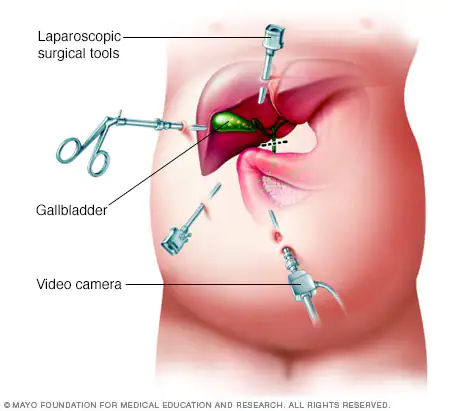
Open cholecystectomy:
Open cholecystectomy is a surgery to remove the gallbladder stones. It is a larger incision than laparoscopic cholecystectomy, and it is typically used when laparoscopic surgery is not possible or when there are difficulties with laparoscopic surgery. During an open cholecystectomy, the surgeon makes a 4- to 6-inch incision in the abdomen below the ribs on the right side. The muscle and tissue are pulled back to show the liver and gallbladder.
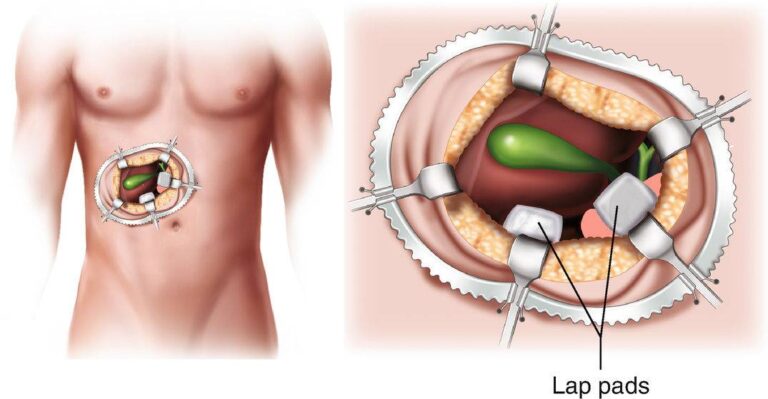
The surgeon then removes the gallbladder and any gallstones that are present. The surgery typically takes about 2 hours and most individuals stay in the clinic for 1-2 days. Open cholecystectomy is a safe and adequate treatment for gallbladder stones. However, it is associated with a longer recovery time and more pain than laparoscopic cholecystectomy. In addition to surgery, there are some other treatment for gallbladder stones that may be considered in certain cases.
Oral Medication:
Oral medication is a non-surgical treatment option for gallbladder stones. Medications to dissolve gallbladder stones are rarely utilized and are reserved for those unable to undergo surgery due to other medical issues. Oral medication is not always successful in dissolving gallstones. If the stones do not dissolve, or if they cause symptoms, surgery may be necessary. If you have gallstones, it is important to talk to your doctor about the best treatment options for you. The best gallbladder stone treatment in Pune, Maharashtra, depends on the severity of your symptoms and the size and location of the gallstones.

Robotic Cholecystectomy:
Utilizing the state-of-the-art Da Vinci Robotic Surgical System, this advanced technique allows for greater precision and control during surgery. Dr. Samrat Jankar, a highly experienced Surgical Gastroenterologist, specializes in robotic GI surgeries. The robotic system enhances visualization and allows for intricate movements that can result in less tissue damage and quicker recovery.

Benefits of Laparoscopic Gallstone Surgery vs Open Surgery:
Here are some of the benefits of laparoscopic cholecystectomy over open cholecystectomy:
- Lower risk of complications
- Faster recovery
- Shorter hospital stay
- Smaller incisions
- No long-term wounds or scars left behind
- Minimal intraoperative bleeding involved
How to prevent Gallstones?
There is no sure way to prevent gallstones, but there are some things you can do to reduce your risk:
- Maintain a healthy weight
- Eat a healthy diet
- Lose weight if you are obese
- Avoid rapid weight loss
- Eat regular meals
- Drink plenty of fluids
- Avoid certain medications
- Get regular exercise
What is the Cost of Laparoscopic Cholecystectomy surgery in Pune, Maharashtra?
The average cost of gallbladder stone removal surgery in Pune, Maharashtra, can be Rs. 45,000- 3,50,000. Also, the cost may depend upon different parameters such as patient health, Type of surgery, hospital stay, instrument used, and Postoperative medication. Dr. Samrat Jankar provides gallbladder stone surgery in Pune at very affordable costs.
View our recent Case Study
A 35-year-old female came with repeated upper abdominal colicky pain for the last 6 months. On USG she was diagnosed to have multiple gallbladder stones. After evaluation, laparoscopic cholecystectomy was planned. She underwent daycare surgery. Discharged from the hospital within 24 hours with comfortably.
According to Dr. Samrat Jankar laparoscopic surgeon in Pune, India, “the excess cholesterol or bile forms crystals, which eventually form stones. The risk of developing gallstones tends to increase with age (especially after age 40 years)”.To read more about the case, click here.
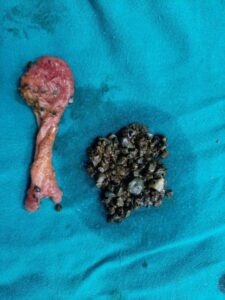




Why Choose Us:
- Expertise and Experience: With a successful track record in the field of surgery, Dr. Jankar is well-versed in diagnosing and treating gallbladder stone-related problems. His comprehensive experience ensures that you receive the best possible care.
- Advanced Technology: The clinic is equipped with state-of-the-art surgical technology to ensure the best surgical outcomes.
- Patient-Centered Care: Your well-being is our top priority. Dr. Jankar takes the time to listen to your concerns, answer your questions, and tailor treatment plans to your individual needs. You’re in skilled and caring hands.
- Patient Education: We believe in assigning patients with knowledge. We will guide you through the surgical procedure and answer any questions you may have.
- Preoperative and Postoperative Care: We provide thorough preoperative consultations to manage any concerns and ensure patients are well-prepared for surgery. Our postoperative care concentrates on a smooth recovery, including pain management, dietary guidance, and follow-up appointments.
Request a Call Back:
If you’re seeking effective and compassionate care for gallbladder stone surgery in Pune, Maharashtra, India, don’t hesitate to get in touch with us. Our dedicated team is here to answer your questions, provide information, and schedule appointments. Reclaim your well-being with the expertise of Dr. Samrat Jankar and our experienced medical professionals. For more details about our vast treatment options, or to request an appointment with Dr. Samrat Jankar to avail of the best gallstone specialist in Pune, India call 9763635252






